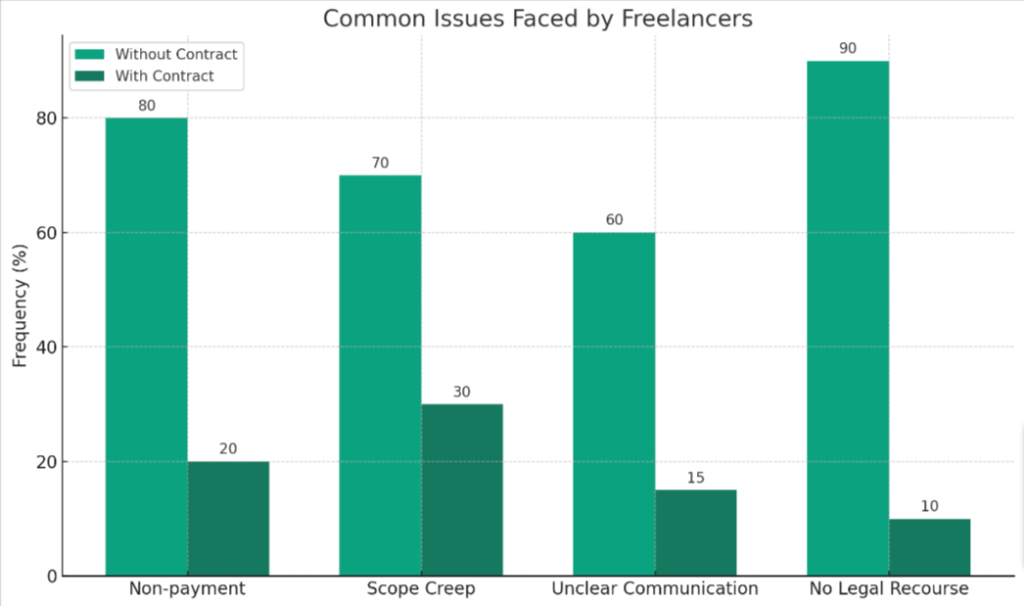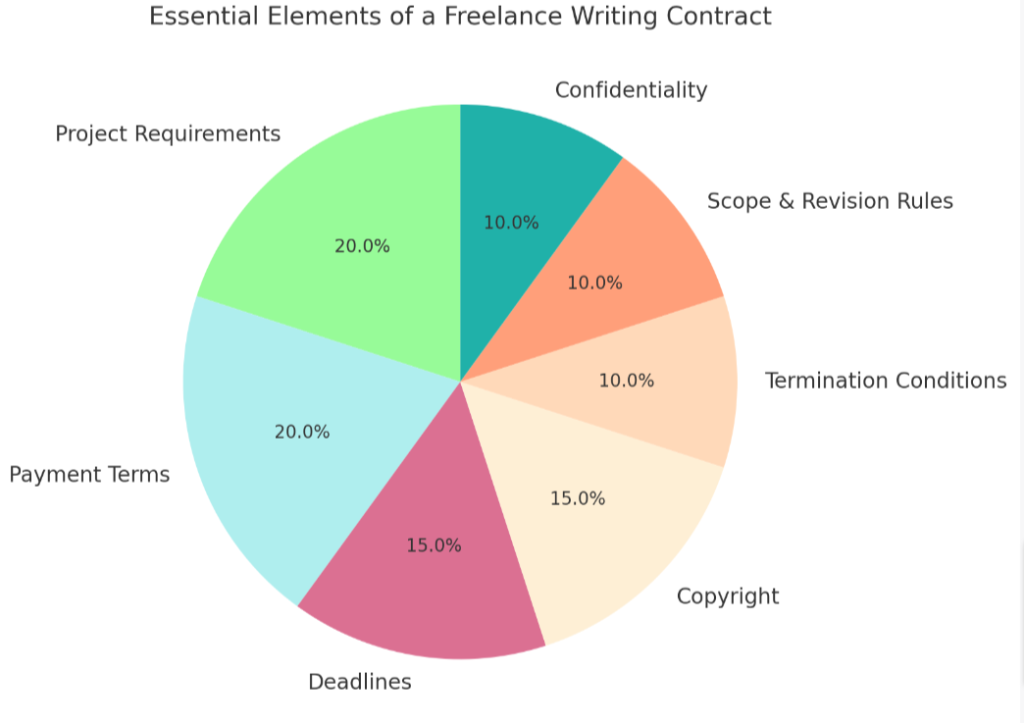Essential Contract Insights for Freelance Writers
Are you a freelance writer looking to protect your work and ensure fair compensation? Contracts 101: What Every Freelance Writer Should Know is here to help. Did you know that contracts play a crucial role in freelancing? In this article, we will break down the essentials of freelance contracts and explain how they benefit both writers and clients. Get ready to gain valuable insights into creating effective contracts for your freelance writing business. Let’s dive right in!
Key Takeaways
- Contracts serve as a crucial backbone for freelance writers, protecting their work and ensuring fair compensation.
- Freelance contracts outline project requirements, payment terms, and deadlines to prevent misunderstandings and provide clear communication.
- Copyright clauses in contracts give writers legal rights to their work unless explicitly transferred over to clients.
- Contracts act as insurance against non – payment scenarios and establish conditions for termination with predefined penalties or obligations.
Importance of contracts for freelance writers
For freelance writers, contracts serve as a crucial backbone for their work agreements. They provide a detailed outline of the project requirements, payment terms, and deadlines. Not only do they protect the interests of both parties involved – the writer and the client – but also pave the way for clear communication.
Contracts ensure that no misunderstanding occurs regarding content expectations or remuneration.
Recognizing copyrights is another vital aspect that contracts address. This gives writers legal rights to their work unless explicitly transferred over to clients in writing within contractual clauses.
Furthermore, contracts act as insurance against non-payment scenarios that many freelancers dread facing. They lay out conditions for termination by either party with predefined penalties or obligations.

Overview of key points
Contracts serve as the backbone of freelance work, ensuring both parties adhere to the decided terms. They provide a clear cut description of project details and establish expectations including deadlines and payment terms.
Critical elements like copyright issues, termination rights, confidentiality clauses add more security to these agreements. To make an effective contract, always address potential conflicts and ensure all fees are stated explicitly.
These official documents not only protect a freelancer’s rights but also build trust with clients by maintaining transparency.
Understanding Freelance Contracts
Freelance contracts are a crucial tool for freelance writers, ensuring fair compensation and protection for both the writer and the client. Find out why contracts are essential in this blog post.
Read more to learn how to protect your interests as a freelance writer.
Role of contracts in ensuring payment, fair compensation, and protection
Contracts are essential tools in the freelance world, significantly reducing financial risk and promoting fairness. They serve as binding agreements that guarantee payment for services provided by a freelance writer.
Also, contracts detail compensation rates to avoid disputes or confusion regarding pay.
Moreover, contracts offer protection for both the freelancer and their client. For a freelancer, it provides security against non-payment and altered terms of work post agreement. On the other hand, clients get assurance about project timelines, scope of work, and quality standards expected.
It’s clear that freelance writing contracts wield immense power toward creating an environment where everyone feels secure in doing business together.
How contracts benefit both the writer and the client
Contracts serve as a safety net for both the writer and the client. They establish clear expectations and provide protection for both parties involved. On one hand, freelancers have an assurance of getting paid on time for their work by defining payment terms in the contract.
It also safeguards them from sudden changes or unwarranted demands by setting out scope, deadline directives, and revision rules.
On the other hand, clients benefit from contracts too. Contracts define what they can expect regarding deliverables and timelines from writers ensuring that there are no misunderstandings later down the line about what was agreed upon.
Additionally, confidentiality clauses within contracts protect sensitive business information shared with writers during project execution.
Essential Elements of a Freelance Writing Contract
Include names, contact information, project details, payment terms, and signatures. Ensure a solid foundation for your freelance work.
Names and contact information of both parties
To create a solid freelance writing contract, it’s essential to include the names and contact information of both parties involved. This helps establish clear communication channels throughout the project.
By including accurate names and up-to-date contact details for both the writer and the client, you can ensure that any issues or questions can be addressed promptly. Additionally, having this information in the contract provides a level of accountability for both parties, making it easier to resolve any disputes that may arise during the course of the freelance work.
Including these details also helps protect your rights as a freelancer. Should any legal action become necessary due to non-payment or breach of contract, having accurate personal information from both parties will be crucial in pursuing your case.
It is important to provide full names and current contact information so that there are no delays or confusion when it comes time to enforce contractual obligations or resolve any potential conflict.
Remember, attention to detail in this aspect will set a strong foundation for a successful working relationship with your client.
Project details and scope of work
The project details and scope of work are crucial components of a freelance writing contract. These sections outline the specific tasks, deliverables, and timelines that both the writer and the client agree upon.
By clearly defining what needs to be done and when it should be completed, this ensures that expectations are set from the beginning of the project. It also helps prevent misunderstandings or disagreements down the line regarding what was required.
A well-defined scope of work enables freelancers to focus their efforts on meeting the client’s needs while providing clients with a clear understanding of what they can expect from the writer.
Invoicing and payment information
As a freelance writer, it is crucial to include clear and detailed information about invoicing and payment in your contracts. This section should outline the payment terms, including the amount, due date, and any late fees or penalties.
Specify how you prefer to be paid (e.g., PayPal, bank transfer) and provide your billing address as well. By clearly stating these details upfront, you can ensure that both parties are aware of their financial responsibilities and avoid any misunderstandings or delays in payment.
Remember to include keywords such as “freelance writer contract agreement” and “payment terms” when discussing invoicing and payment information in your contracts.
Copyright, canceling, and confidentiality clauses
The copyright, canceling, and confidentiality clauses are important elements to include in a freelance writing contract. The copyright clause specifies who owns the rights to the written work and how it can be used.
This helps protect both the writer’s intellectual property and ensures fair compensation for their work. The canceling clause outlines under what circumstances either party can terminate the agreement, providing clarity in case of any unforeseen issues or conflicts.
Lastly, the confidentiality clause establishes that all information shared between the writer and client must remain confidential, protecting sensitive material from being disclosed to third parties without consent.
Right to terminate
The right to terminate is an important aspect of freelance contracts that both writers and clients should be aware of. This clause allows either party to end the agreement if certain conditions are not met or if there is a breach of contract.
For example, as a writer, you may have the right to terminate if the client fails to make payment within a specified timeframe or if they consistently change the scope of work without proper compensation.
On the other hand, clients may also have the right to terminate if the writer consistently misses deadlines or fails to deliver quality work. It’s crucial for both parties to understand their rights in order to protect themselves and maintain a professional working relationship.
Signatures
Both parties involved in a freelance writing contract must sign the agreement to make it legally binding. The signatures serve as proof that both the writer and the client have read, understood, and agreed to the terms and conditions outlined in the contract.
By signing, you are acknowledging your commitment to fulfilling your responsibilities as stated in the agreement. It is important to ensure that all parties sign before work begins to avoid any potential disputes or misunderstandings down the line.

Tips for Creating an Effective Freelance Writing Contract
Include specific deadlines and expectations, clearly state payment terms and any additional fees, and address any potential issues or conflicts.
Include specific deadlines and expectations
Include specific deadlines and expectations in your freelance writing contract. Clearly define when the project should be completed and any milestones or deliverables along the way.
Be specific about the format, word count, or other requirements for each piece of content. This ensures that both you and your client are on the same page and helps avoid misunderstandings later on.
Setting clear expectations from the start can help pave the way for a successful working relationship with your clients.
Clearly state payment terms and any additional fees
Include a clear and concise description of the payment terms in your freelance writing contract. Specify when and how you will be paid, whether it’s a flat fee or by the hour. Be sure to outline any additional fees that may apply, such as rush fees or revision charges.
This clarity will help avoid any confusion or disputes regarding payment, ensuring that both parties are on the same page from the start. Remember to include all relevant details about invoicing, including deadlines for submitting invoices and expectations for payment timelines.
Address any potential issues or conflicts
To create a solid freelance writing contract, it’s crucial to address any potential issues or conflicts that may arise during the course of the project. This includes outlining how disputes will be resolved, specifying what happens if either party fails to meet their obligations, and clearly stating the consequences for breach of contract.
By addressing these issues upfront, both the writer and the client can ensure a smoother working relationship and minimize any uncertainties or disagreements that may occur.
Conclusion
In conclusion, freelance writers need to understand the importance of contracts in protecting their rights and ensuring fair compensation. By including key elements such as project details, payment terms, and copyright clauses, writers can create effective contracts that benefit both themselves and their clients.
Taking the time to negotiate and create clear agreements will set a solid foundation for successful freelance work.

